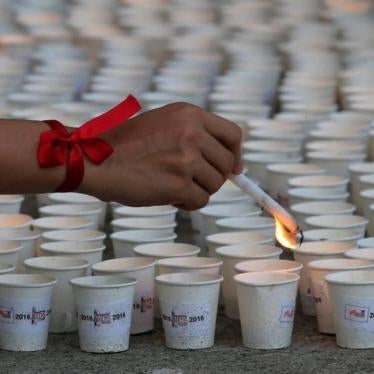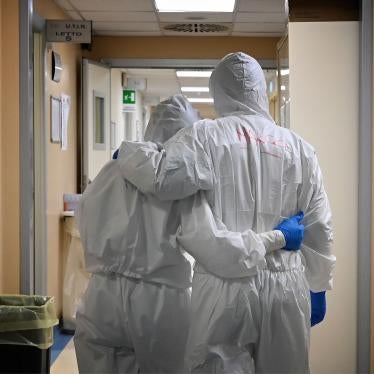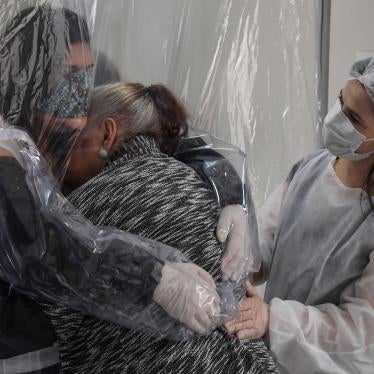Special Rapporteur on the human right to safe drinking water and sanitation
Sustainable Human Development Section
Special Procedures Division
UNOG – OHCHR
Palais des Nations
CH-1211 Geneva 10, Switzerland
Dear Special Rapporteur de Albuquerque,
Please accept our submission in response to your January 28, 2014 request for information in relation to your annual thematic report to the Human Rights Council.
Human Rights Watch has included research on water access and water disputes in its human rights reporting as early as 1999. Most recently, a number of our reports have addressed the right to water as it relates to resettlement of communities for large-scale mining projects throughout Africa.[1] In Ethiopia’s lower Omo Valley, we have recently researched the impact of water use for hydropower and sugar plantation development on the half million pastoralists in Ethiopia and Kenya who rely on the same water source to sustain their livelihoods.[2] Human Rights Watch research has also in the last several years looked at the impact of highly pollutant industries, such as tanneries or artisanal gold mining, on water quality and access.[3] In your effort to develop a typology of common violations of the right to water and how they relate to underlying structural causes and power relations, we are available to provide further information or answer questions related to this research.
This submission, however, centers on access to water and sanitation in Zimbabwe. Our report, “Troubled Water: Burst Pipes, Contaminated Wells, and Open Defecation in Zimbabwe’s Capital,” was Human Rights Watch’s first to be focused solely on the rights to water and sanitation. Based on research conducted between September 2012 and October 2013, “Troubled Water” finds that corruption and mismanagement at the local and national levels of government exacerbate a situation where people living in Harare have little access to potable water and sanitation services, leaving many to drink water from shallow, unprotected wells that are contaminated with sewage, and to defecate outdoors. We explain the situation in detail below, in response to the specific questions posed by your request.
1. Violations of Rights to Water and/or Sanitation in Harare, Zimbabwe
Between September 2012 and October 2013, Human Rights Watch researched the water and sanitation situation in eight suburbs of Harare, Zimbabwe. We found a number of violations of the rights to water and sanitation, including insufficient water quantity and availability, poor water quality, economic inaccessibility of water, inaccessibility of water for vulnerable and marginalized groups, and lack of access to adequate sanitation services. We also found violations of related rights, including the rights to education and components of the right to health, primarily regarding access to information.
Rights to Water and Sanitation
Availability
Among the people we interviewed, everyone reported a longstanding lack of access to water. While the homes we visited had the infrastructure for the provision of piped water, the water was only available erratically. As a result, people described having to ration water, and forgo basic needs like sanitation and hygiene. Boreholes provide an additional source for water, but the lines can be very long, with some people having to wait up to five hours a day. Some of the people Human Rights Watch interviewed reported collecting 20 liters of water from boreholes for their household to last one to two days, far less than the WHO recommended 50 to 100 liters a day. Many people we spoke with reported relying on shallow wells they dug themselves to access water.
Quality
Even when water is available via taps, people interviewed by Human Rights Watch expressed concerns regarding the quality of the water. Some people reported that when they drink the tap water it makes them sick. A number of people we interviewed told Human Rights Watch that at times they have seen raw sewage and visible particles floating in the water that comes from the taps. People we interviewed believed that the water quality was higher at the boreholes. People who relied on self-dug wells for water also expressed concerns about the quality of water from these wells. The water from these wells is often retrieved using dirty buckets and rope stored in the open, which provide another opportunity for contamination.
Economic Accessibility
In each of the communities we visited in Harare, people reported that their water had been shut off, or they had received threats that it would be shut off because of unpaid water bills. People routinely showed us water bills that were in excess of US$1000. Failure to pay the bills could result in disconnection of water services, making water economically inaccessible to many families. Some families reported that they struggle to afford both schools fees for their children and water for the household.
Physical Accessibility – Violence
Many people told Human Rights Watch that violence at the borehole was a significant hindrance to collecting water. In general people said that the situation at boreholes became more desperate when tap water was unavailable for a period of time. Women described to Human Rights Watch scenes of fighting at boreholes, with one woman telling us about a fight where people drew machetes.
Non-Discrimination
Please see section below on Groups Disproportionately Affected by Lack of Access to Water and Sanitation in Harare.
Sanitation
Many of the people interviewed by Human Rights Watch said that they lacked access to basic sanitation. While most people we spoke to had indoor flush toilets, almost no water comes through the pipes and those systems are non-functional. Therefore, people reported having to rely on alternative water sources to flush their toilets. When water access is very limited, many of the residents told Human Rights Watch that they defecate outdoors.
People who spoke with Human Rights Watch did report that they would flush their toilets when there was water in the system, but that the sewage pipes were often bursting, that sewage at times comes up from the toilet, and that raw sewage flowing on the street was not uncommon. We observed children playing near areas where raw sewage was visible.
Human Rights Watch also found that refuse removal was a problem in these communities. Across the high-density suburbs of Harare, refuse gathers in large mounds, which can clog already overburdened sewer system. In some areas there is refuse pickup that is fairly consistent, while in others people told use there had not been pickup in several weeks or even months. However, even in places where City Council sent refuse workers, challenges prevent the system from working effectively. For example, in several suburbs, women said that they were afraid to put their refuse bins out because they were routinely abused by the City Council workers who picked the bins up.
Right to Health
Access to information is a key component of the realization of the right to health. However, nearly all of the people Human Rights Watch spoke with said that they did not know if their water was safe to drink. People reported receiving conflicted messages about water quality from healthcare workers and government officials. While the majority of residents Human Rights Watch spoke to identified boreholes as the safest source of water since many were drilled by donor agencies, a January 2013 study by Harare Water found that one-third of boreholes tested were contaminated.
Right to Education
Human Rights Watch found that some schools in the Harare suburbs are not able to provide students with safe drinking water. In some areas, when there is no tap water, children are sent home from school. One woman explained to Human Rights Watch researchers that while her grandchildren avoid drinking tap water in their home because of fear of contamination, at school her grandchildren had no choice but to drink potentially harmful tap water.
Inadequate water and sanitation services in school make it challenging for girls who are menstruating to attend school. A study done in Chitungwiza, a commuter town of Harare, showed that girls who are menstruating face numerous challenges in attending school, due to lack of adequate sanitation, including a lack of appropriate disposal for sanitary pads, severe overcrowding with insufficient toilets, and inadequate water supply and little provision for hand washing.[4]
2. Structural Causes and/or Underlying Determinants
Based on our research, the underlying structural cause of these violations is pervasive corruption and mismanagement of funds by all levels of government. On the national level, the government has not prioritized addressing the water and sanitation crisis. Although there is a “right to water” articulated in the new Zimbabwe constitution, no plan has been articulated to facilitate access to this right. The government consistently cites lack of resources as the reason that the water and sanitation needs of the country continue to go unmet. At the same time, there are questions and allegations regarding what are thought to be hundreds of millions of dollars in diamond revenue missing from public coffers.
On the local level, budget guidelines for Harare specify that the majority of revenue from water must be ploughed back into the system for maintenance and improvement, but even government officials acknowledge that the money is diverted for other uses, specifically paying extremely bloated salaries to top officials in the local government. As a result, key parts of the service delivery system, like purchasing water treatment chemicals, are not adequately funded, which means that the city produces less water.
While the link between the right to health and the rights to water and sanitation are well documented, the governments continued failure to provide access to water and sanitation in Harare are particularly grave in light of the continued risk of a cholera epidemic. In 2008-2009, as Zimbabwe’s economy and government collapsed, the country experienced a devastating cholera outbreak that killed over 4,000 people and sickened 100,000 more. Five years after the outbreak, the conditions that allowed the epidemic to flourish in the high-density areas around Harare, home to an estimated 4 million people, persist.
3. Groups Disproportionately Affected by Lack of Access to Water and Sanitation in Harare
Access to water and sanitation can be particularly challenging for people who are already vulnerable or marginalized. We found this to be true in Harare, in particular for women, children, the elderly, people with disabilities and those living with HIV. Also, we found that low income populations are disproportionately affected by lack of access to water and sanitation. As opposed to higher earning populations, lower income families are not able to purchase clean water to drink or an adequate amount of water to sustain daily life. Because water and sanitation are so closely linked, it follows that low income families without water also do not have access to sanitation services, and are forced to defecate outdoors.
Women and children
Women and children bear a disproportionate burden in accessing water and sanitation. Human Rights Watch spoke to a few women who were pregnant or recently gave birth. Despite the challenges of carrying water while pregnant or recently post-partum, with a newborn, these women have to go and wait at boreholes for water.
Because the task of getting water from boreholes overwhelmingly falls on women and children, they face the brunt of the violence that can occur there. People reported to Human Rights Watch that although women and children disproportionately are responsible for collecting the water at boreholes, the violence that people reported is mostly instigated by men.
Children are particularly vulnerable to waterborne disease. In Zimbabwe, diarrhea is responsible for 10 percent of deaths of children under five. Women are also most often the caregivers, and therefore bear the burden of caring for children and family members made sick by poor water and sanitation.
The negative impact of poor water and sanitation at schools in Harare on the right to education is greater for girls. One family reported that they currently cannot afford to send their granddaughter to school, but they are worried that if she did go back to school the family would struggle to get their water.
People with disabilities
When taps do not work, collecting water can be challenging for people with disabilities or the people who care for them. Often people in these groups must rely on others for help with basic needs, such as collecting water, going to the toilet, and bathing, because accessible services are not available. For example, Human Rights Watch spoke with the mother of a teenage daughter who has intellectual and physical disabilities and uses a wheelchair. The daughter uses diapers, and the household needs more water to care for her and keep her clean. The mother cannot take her daughter with her to collect water, and has to lock the girl in the home, often for hours, while she goes for water.
People living with HIV
As the Office of the High Commissioner for Human Rights has noted, lack of access to clean water has a severe impact on people with compromised immune systems, particularly people living with HIV. They need clean water to take medications and for regular access to water for bathing and hygiene to prevent infection. Human Rights Watch spoke with a few people living with HIV, or caring for a loved one with HIV, who explained how difficult the situation in Harare was for them. One household, where a mother, father and 4-year-old boy all are living with HIV, reported having to take their medication with dirty water. The woman reported that on the day she spoke to Human Rights Watch, she had diarrhea for three days straight.
One woman living with HIV told Human Rights Watch that one of her children, who also was HIV positive, died of typhoid in 2012. The family also suffered from cholera in 2008.
A 17-year-old girl living with HIV reported that a new water pump installed near her made a significant positive impact in her self-care. Previously, she had to wait for several hours at a borehole for water. She sometimes would take her medication with just tap water, even if it looked or smelled dirty. Now, the new water pump makes collecting water much faster.
The Elderly
Elderly people also reported to Human Rights Watch that they had more difficulty accessing water. One woman simply stated that she was “too old” to wait in the long lines at the borehole. She instead often gets her water from unprotected sources.
In response to your questions 5 and 6, Human Rights Watch has not taken any cases on the rights to water and/or sanitation to court. However, we have sought to address the issue of water turn-offs for lack of payment in Harare with a number of government officials and members of the UN WASH working group. We have conducted public advocacy on all the violations outlined above through opinion pieces, a multimedia piece and outreach to Zimbabwean and international journalists. Attempts for higher level government meetings were not successful in 2013, but we plan to continue our efforts in the coming months.
We thank you for the opportunity to provide this information and are ready to answer any further questions you or your staff may have.
Sincerely,
Joseph Amon, PhD MSPH
Director, Health and Human Rights Division
Human Rights Watch
[1] See Human Rights Watch, Whose Development? Human Rights Abuses in Sierra Leone’s Mining Boom, February 2014, https://www.hrw.org/reports/2014/02/19/whose-development-0; and Human Rights Watch, “What is a House without Food?”:Mozambique’s Coal Mining Boom and Resettlements, May 2013, https://www.hrw.org/reports/2013/05/23/what-house-without-food.
[2] ”Ethiopia: Land Water Grabs Devastate Communities,” Human Rights Watch news release, February 19, 2014, https://www.hrw.org/news/2014/02/18/ethiopia-land-water-grabs-devastate-...
[3] See, for example, Human Rights Watch, “Toxic Tanneries: The Health Repercussions of Bangladesh’s Hazaribagh Leather,” October 2012, https://www.hrw.org/reports/2012/10/08/toxic-tanneries; Human Rights Watch, “Toxic Oil: Child Labor and Mercury Exposure in Tanzania’s Small-Scale Gold Mines,” August 2013, https://www.hrw.org/reports/2013/08/28/toxic-toil.
[4] Blessing Dube and James January “Factors Leading to Poor Water Sanitation Hygiene Among Primary School Going Children in Chitungwiza,” Journal of Public Health in Africa, 3 (2012), accessed August 8, 2013








